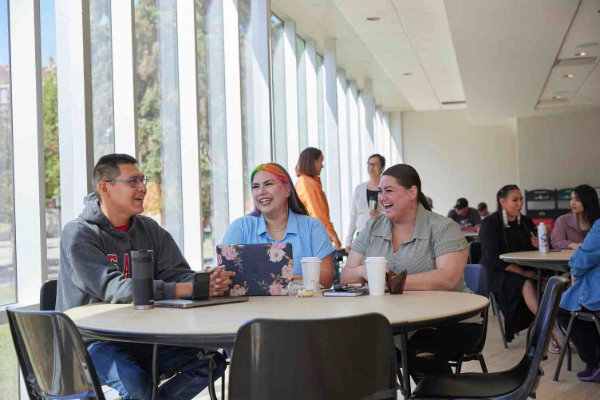What does the OCC do?
SAIT's Office of Community Conduct (OCC):
- supports the ongoing development of SAIT’s culture of academic integrity
- works with schools/departments in addressing student academic misconduct cases
- develops and maintains SAIT’s procedures and documents used when addressing student misconduct that meet administrative law requirements and natural justice principles
- helps SAIT set and maintain community standards for student academic and non-academic conduct
- investigates and manages student non-academic misconduct cases in collaboration with other SAIT stakeholders
- is a resource for students experiencing harassment, bullying, violence or sexual violence
- provides education and training to members of the SAIT community.
What is academic integrity?
The International Center for Academic Integrity defines academic integrity as a commitment to six fundamental values – honesty, trust, fairness, respect, responsibility, and courage- even in the face of adversity.
From these values flow principles of behaviour that enable academic communities to translate ideals into action. The Fundamental Values of Academic Integrity describes these core values in detail and provides examples of how to put them into practice on campuses, in classrooms, and in daily life.
SAIT is committed to academic integrity, which is grounded in SAIT’s fundamental values of fairness, integrity, respect, safety and transparency.
Academic integrity also involves honesty, responsibility and trust. SAIT requires students and employees to honour these values at all times. Academic integrity is essential to education and scholarship. It is also fundamental to SAIT’s reputation and the value of SAIT’s credentials.
All members of the SAIT community — students, instructors, academic managers and senior leaders — play a role in developing and supporting SAIT’s culture of academic integrity. In collaboration with the Office of Community Conduct, they are responsible for creating a learning environment where student academic misconduct is discouraged, reported and addressed.
Fundamental ways you can demonstrate these values
The quality of being honest, free from fraud or deception, legitimate, truthful.
- Be truthful.
- Give credit to the owner of the work.
- Keep promises.
- Provide factual evidence.
- Aspire to objectivity, consider all sides and one’s own potential preconceptions.
The assured reliance on the character, ability, strength, or truth of someone or something.
- Clearly state expectations and follow through.
- Promote transparency in values, processes, and outcomes.
- Give credence.
- Encourage mutual understanding.
- Be genuine.
The quality or state of being fair, especially fair or impartial treatment, lack of favoritism toward one side or another.
- Apply rules and policies consistently.
- Engage with others equitably.
- Keep an open mind.
- Be objective.
- Take responsibility for your own actions.
High or special regard, esteem; the quality or state of being esteemed.
- Practice active listening.
- Receive feedback willingly.
- Accept that others’ thoughts and ideas have validity.
- Show empathy.
- Seek open communication.
- Affirm others and accept differences.
- Recognize the consequences of our words and actions on others.
The quality or state of being responsible; moral, legal, or mental accountability; reliability, trustworthiness.
- Hold yourself accountable for your actions.
- Engage with others in difficult conversations, even when silence might be easier.
- Know and follow institutional rules and conduct codes.
- Create, understand, and respect personal boundaries.
- Follow through with tasks and expectations.
- Model good behaviour.
The mental or moral strength to venture, persevere, and withstand danger, fear, or difficulty.
- Be brave even when others might not.
- Take a stand to address wrongdoing and support others doing the same.
- Endure discomfort for something you believe in.
- Be undaunted in defending integrity.
- Be willing to take risks and fail.
*Information sourced from the International Center for Academic Integrity (ICAI).
Conduct resources for students
Academic conduct
Academic conduct is related to your behaviours directly impacting your studies, such as plagiarism, cheating, and other actions that may give you an unfair advantage.
Non-academic conduct
Non-academic conduct is related to your behaviour in the SAIT community, including those that could lead to a complaint, such as bullying, harassment, vandalism or fighting.

Academic conduct for faculty and staff
Learn from an instructor and staff perspective why academic integrity is vital to SAIT.

Non-academic conduct for faculty and staff
SAIT’s approach to student non-academic misconduct focuses on education, prevention, proportional responses, and repairing harm to the community.
Contact us
Our Organization

Oki, Âba wathtech, Danit'ada, Tawnshi, Hello.
SAIT is located on the traditional territories of the Niitsitapi (Blackfoot) and the people of Treaty 7 which includes the Siksika, the Piikani, the Kainai, the Tsuut’ina and the Îyârhe Nakoda of Bearspaw, Chiniki and Goodstoney.
We are situated in an area the Blackfoot tribes traditionally called Moh’kinsstis, where the Bow River meets the Elbow River. We now call it the city of Calgary, which is also home to the Métis Nation of Alberta.
